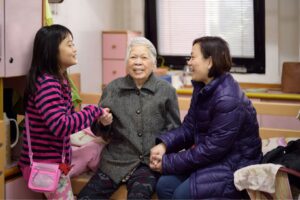Dementia is a devastating diagnosis at any age, but when it arrives earlier than expected, the impact can be especially disorienting and life-altering. Early onset dementia—now more commonly referred to as young onset dementia—typically affects people under the age of 65, often while they are still actively working, parenting, and planning for retirement.
Alexandra Kaplan, MA (Gerontology), Institute on Aging’s Lead Caregiver Coach and a gerontologist, supports families facing this unique form of dementia. Her perspective highlights just how different the experience can be for younger individuals and their loved ones. “Fifty is young,” she says. “You’re still looking forward to becoming an empty nester, maybe even just hitting your stride professionally. You don’t expect something like this.”
When Does Early Onset Dementia Start, and Why Is It So Difficult?
The diagnosis of early onset dementia introduces complications that go far beyond cognitive decline. A person in their 50s or early 60s may need to retire years ahead of schedule, long before they are financially prepared. Their spouse or partner may still be working full time, while children might still live at home or be just entering college.
Unlike older adults who may have larger support networks or adult children able to step into caregiving roles, younger individuals often face these challenges without the same degree of community understanding or systemic support. It can feel isolating—especially when trying to connect with peers who may not be able to relate to such a life-changing experience.
Understanding Symptoms and Seeking Early Detection
One of the most important steps in navigating early onset dementia is knowing what to look for—and when to act. Kaplan notes that early warning signs can sometimes be dismissed or confused with “normal” aging or other midlife changes. For instance, memory lapses or confusion may be attributed to menopause, stress, or fatigue.
Kaplan emphasizes the value of early evaluation. “If you’re experiencing noticeable changes in memory or behavior, it’s worth seeing a doctor,” she says. A common example of concerning forgetfulness? Not remembering an event that happened earlier the same day, like a doctor’s appointment. Getting lost on familiar routes, increased isolation, and difficulty following conversations may also be warning signs worth investigating.
Where Can Families Turn for Early Onset Dementia Support?
While there is no cure for dementia, early diagnosis can open the door to helpful support services, emotional counseling, and better planning for the future. Kaplan encourages families to seek out resources quickly, including family counseling if children are in the home. “It impacts everyone,” she says, “and it’s important to start getting support right away.”
Additionally, finding community and connection is vital. While not every support group may be a perfect demographic fit for younger caregivers, many find value in a shared experience and emotional validation. Others find connection through one-on-one caregiver coaching or therapy.
“No matter your age, no one should have to go through this alone,” Kaplan says.
At Institute on Aging, Companioa is our suite of programs that support aging adults living with dementia and their family caregivers. Companioa includes: In-Home Personalized Dementia Care, meaningful daily engagement at Enrichment Center in the Presidio, and Caregiver Coaching and Care Management. IOA’s services are here to help families find clarity, support, and connection in every phase of the dementia journey. If you’re navigating a young onset dementia diagnosis, we are here with resources, programs, and guidance to help you find clarity and community in uncertain times.





